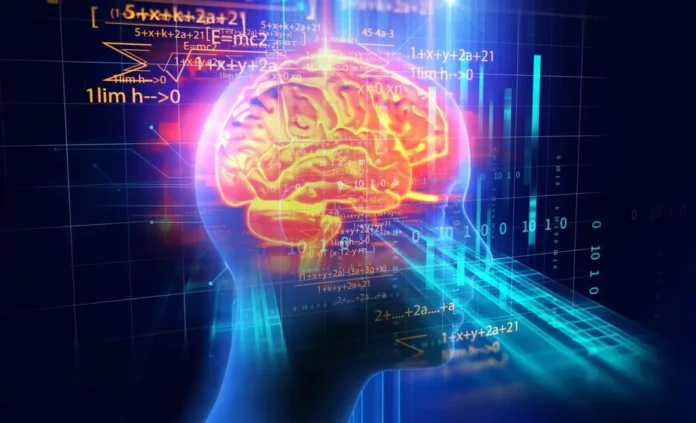Human Brain Processing Speed has always fascinated scientists and researchers, as it holds the key to understanding human cognition, decision-making, and evolution. Recent studies reveal that the human brain processes information at a speed of just 10 bits per second. This is strikingly slow when compared to internet speeds, such as typical Wi-Fi connections that process about 50 million bits per second.
Despite receiving billions of bits of data through our senses every moment, the brain’s information processing ability is considered “extremely slow.” Researchers suggest this phenomenon is rooted in human evolution, where survival depended not on speed but on accuracy and adaptability. The slow processing speed of the brain may reflect its prioritization of survival-based tasks over rapid data handling.
How Does The Brain Process Information?
The human brain operates as a highly complex biological computer. While its processing speed may seem limited, it handles multiple tasks simultaneously, such as vision, hearing, and movement. Information enters the brain via sensory organs and is processed in various regions, each specializing in specific functions.
For instance, the visual cortex in the brain processes images, while the auditory cortex deciphers sounds. However, these tasks are not carried out at lightning speed. The delay in processing ensures that the brain filters irrelevant data, focusing on information critical for survival and decision-making.
Comparing Human Brain And Internet Speeds
The comparison between the human brain’s processing speed and the internet’s data transfer rate reveals a stark contrast. Internet technology, with its ability to transmit millions of bits per second, far surpasses the brain’s capacity of 10 bits per second.
However, this comparison must be contextualized. The brain doesn’t process information in the same way as machines. While Wi-Fi handles raw data quickly, the human brain interprets, analyzes, and applies meaning to the data it processes. These higher-order cognitive functions require time, making speed less significant than comprehension.
Why Is The Brain Slower Than Technology?
The brain’s slower speed may stem from evolutionary adaptations. Early humans didn’t face the rapid influx of data that modern technology brings. Their primary tasks—hunting, gathering, and social interactions—required deep focus and careful analysis rather than instantaneous responses.
In contrast, the internet was designed to handle vast amounts of raw data efficiently. Its processing speed reflects technological advancements aimed at meeting the demands of an interconnected, high-speed world.
Evolutionary Perspective On Brain Speed
Evolution has shaped the human brain to prioritize survival. Slower processing may have been advantageous in ensuring deliberate, calculated responses to threats and opportunities. This contrasts sharply with today’s technology-driven society, where speed often takes precedence over thoughtful analysis.
Scientists argue that the brain’s slower speed reflects its ability to filter out unnecessary stimuli. For instance, when walking in a forest, the brain prioritizes spotting predators or edible plants over registering every leaf and shadow.
Advantages Of The Brain’s “Slow” Speed
While the human brain’s processing speed might appear as a limitation, it offers several advantages:
- Focus On Relevance: By processing data at a slower pace, the brain focuses on information that matters, ignoring irrelevant noise.
- Deep Understanding: Unlike the internet, which transmits data without context, the brain assigns meaning to every bit of information.
- Energy Efficiency: The brain’s slower speed conserves energy, a critical factor for survival in early human environments.
Implications For Artificial Intelligence
The gap between human brain processing speed and technological capabilities highlights a challenge for artificial intelligence (AI). While machines excel in rapid data handling, replicating the brain’s ability to assign meaning and context remains a significant hurdle.
AI systems are designed to mimic human cognition, but their reliance on speed often overlooks the importance of depth and relevance. Bridging this gap requires integrating the brain’s nuanced approach to information with the efficiency of modern technology.
Historical Context Of Brain Research
The study of the human brain dates back to ancient civilizations, where philosophers and scientists sought to unravel its mysteries. Early theories viewed the brain as a passive organ, with its active role in cognition only being recognized in the 19th century.
Modern neuroscience has since revolutionized our understanding, revealing the brain’s intricate structure and functions. The recent discovery of its processing speed adds another layer to this understanding, offering insights into human evolution and behavior.
Technological Advancements And Their Impact
The rapid growth of internet technology has transformed human interactions, learning, and work. While it offers unparalleled speed and connectivity, it also raises questions about its impact on cognitive abilities.
Studies suggest that constant exposure to high-speed technology may alter brain function, reducing attention spans and increasing reliance on external devices. Understanding the brain’s natural processing speed can help balance technological use with mental well-being.
What This Means For Future Research?
The revelation of the human brain’s processing speed opens new avenues for research. Scientists aim to explore its implications for learning, memory, and decision-making. It also underscores the importance of designing technologies that complement, rather than compete with, human cognition.
Future studies may focus on enhancing the brain’s processing abilities through training or integrating technology to bridge the speed gap. This could revolutionize fields such as education, medicine, and artificial intelligence.
Human Brain Processing Speed provides a fascinating lens to examine the intersection of biology and technology. While the brain’s pace may be slower than the internet, its capacity for meaning and context makes it unparalleled in complexity and adaptability. Understanding and respecting this balance is key to harnessing the full potential of both human and technological capabilities.



